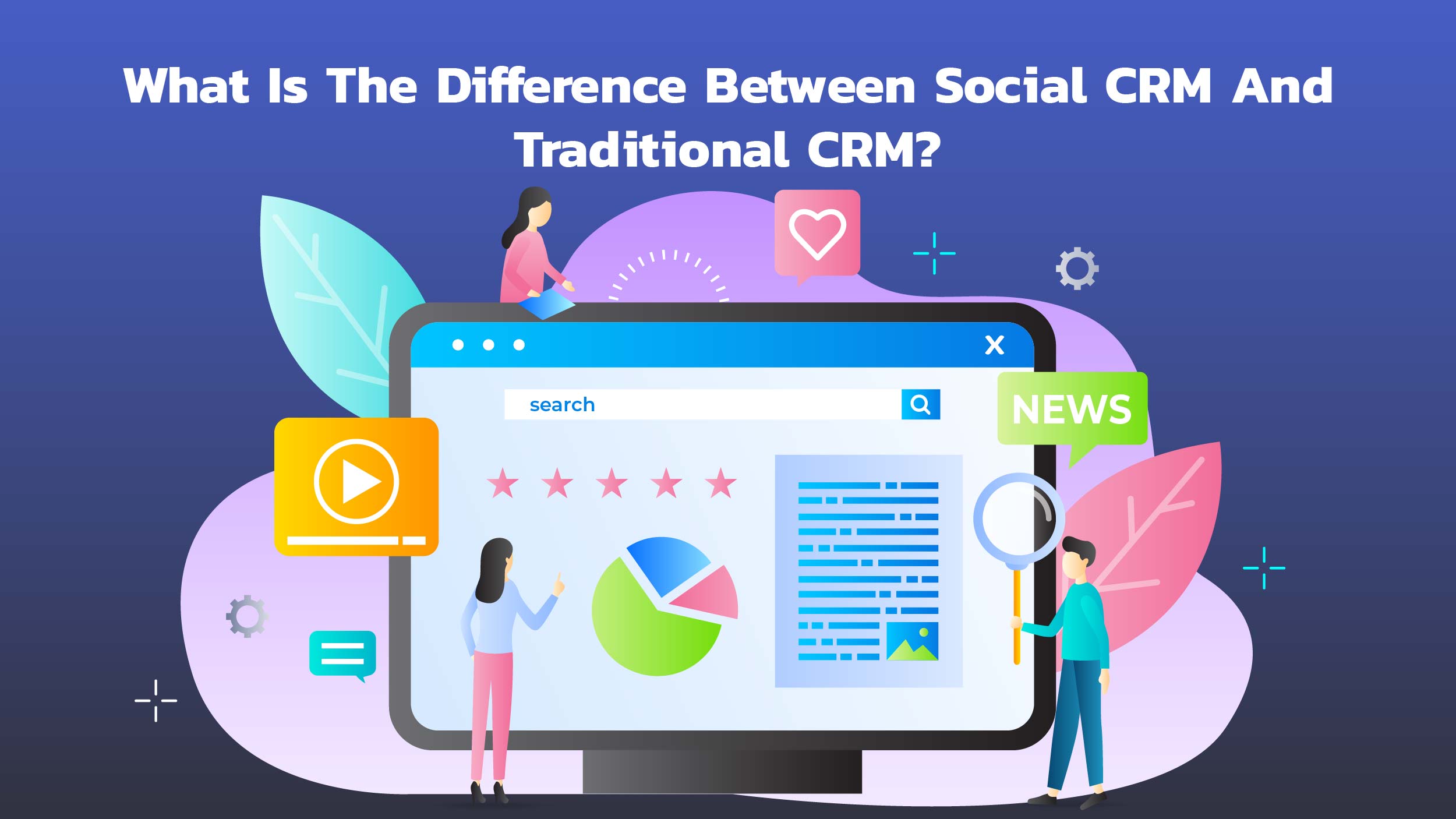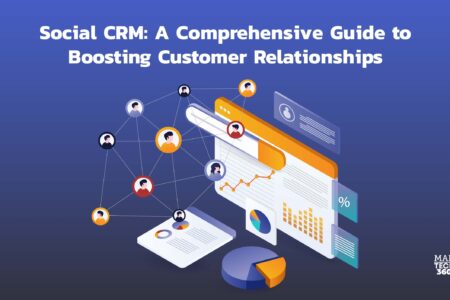In business, people often say that where you are matters most, but that’s not the whole story. To succeed, you also need to focus on building strong relationships. This means connecting well with customers, no matter how big or small the sale. Practicing a good social CRM (customer relationship management) is the best way to do it. Don’t believe us? Check out the statistics.
- Over half the world’s population is on social media, with around 5.04 billion people using it. In the past year alone, 266 million new users have joined social media platforms.
- On average, people use about 7 different social networks every month.
- Internet users spend an average of 143 minutes per day on social media.
With that being said, let’s understand exactly what and how social CRM can help your business.
What is Social CRM?
Social CRM is like an upgraded version of regular CRM, but with a focus on using social media and online communities to manage customer relationships better.
Here’s why social media CRM is great:
- Faster Customer Service: Brands can respond quickly to customer inquiries.
- Social Listening: They can keep an ear out for what people are saying about them online.
- Team Integration: Sales, marketing, and customer service teams can work together seamlessly.
- Monitoring Mentions: Keeping track of when and where the brand is mentioned across different platforms.
- Brand Reputation: Ensuring that the brand’s image stays positive and improving it if needed.
- Content Sharing: Engaging with both existing clients and potential ones through content.
Social customer relationship management also helps gather valuable customer data for personalized service. It’s like a one-stop shop for effective social selling. And it doesn’t stop there!
It helps measure important things like:
- Traffic: Monitoring website visits and click-through rates in real time.
- Brand Mentions: Keeping tabs on what people are saying about the brand online.
- Engagement: Tracking likes, shares, comments, and other interactions.
- Audience Demographics: Understanding who the followers are and how they behave online.
What Is The Difference Between Social CRM And Traditional CRM?

Social customer relationship management (CRM) empowers brands to collect customer data from social media profiles, track conversations, and engage with customers proactively. This real-time interaction capability enables teams to deliver personalized content, ultimately strengthening the bond between the brand and its customers.
What Is The Role Of Social Media In CRM?
Social media plays a pivotal role in customer relationship management by seamlessly integrating social platforms with CRM systems to elevate customer engagement and insight. This integration facilitates a multifaceted approach to customer interactions, encompassing sales communications, customer service, and feedback shared on social media and review platforms. By leveraging social customer relationship management strategies, businesses can effectively target potential customers, provide swift and personalized customer service via preferred social media channels, and enable customers to share their experiences with a wide audience.
The amalgamation of social media and CRM also yields enhanced marketing insights and a more comprehensive understanding of customer behavior, empowering businesses to tailor their strategies and offerings to align with customer preferences. Ultimately, social customer relationship management catalyzes fostering deeper, more personalized relationships with customers, leveraging social media as a valuable touchpoint for interaction and data utilization within the broader CRM framework.
Also Read: Content Collaboration: What Is It And Why Is It Important?
3 Best Social CRM Tools
Here are a few notable social media CRM tools:
HubSpot: Known for its inbound marketing tools, HubSpot offers a social media management tool that integrates with its CRM platform and service platform for support teams.
Agorapulse: This tool includes a built-in social media CRM feature and keeps users updated with trends and hot topics in the online marketplace. It’s often compared to bigger names like Sprout Social, Hootsuite, and Buffer.
Nimble: Endorsed by Mark Cuban, Nimble is designed with social media and collaborative tools in mind, providing a comprehensive solution for social relationship management.
What Is the Disadvantage Of Social CRM?
- Data Privacy and Security: Gathering and analyzing customer data requires strict adherence to data privacy regulations and ensuring the security of customer information. Failure to do so can lead to significant penalties, both financially and legally.
- Data Overload: Social media generates a vast amount of data, which can be overwhelming and distracting. It’s essential to have clear strategic goals to filter out irrelevant metrics and focus on actionable insights.
- Integration with Existing Systems: Integrating social customer relationship management with existing CRM systems and other business applications can be challenging. Choosing a social media CRM tool that seamlessly integrates with your existing tools can streamline implementation and synchronization processes.
Which Is An Element Of Social CRM?
Social customer relationship management involves combining social media platforms with CRM systems to gain insights into customer interactions and enhance the quality of customer engagement. This integration enables businesses to monitor sales communications, interactions on social media, and feedback on review platforms.
Moreover, social customer relationship management reaches out to potential customers via social media, offers convenient customer service, and facilitates personalized marketing efforts. It also emphasizes understanding the language, tone, and topics discussed by the audience, adding a human touch to the brand.
How to Set up a Social CRM?
Setting up a social CRM process doesn’t have to be complicated. Here’s a step-by-step guide to get you started:
- Define Your Objectives: Determine what you want to achieve with social customer relationship managemen. Do you aim to boost customer engagement, foster brand advocacy, or gather market insights?
- Select the Right Tools: Choose a social CRM platform that suits your needs. Look for features like social media monitoring, integration with existing systems, and scalability. Hootsuite is a popular option, but explore other tools to find the best fit.
- Integrate Your Channels: Connect your social media accounts (e.g., Facebook, Instagram, Twitter) with your CRM system. This allows the software to capture valuable customer data such as profiles, activities, and preferences.
- Monitor and Analyze Conversations: Make the most of social listening tools to monitor brand mentions, gauge customer sentiment, and stay abreast of industry trends. Analyze this data to gain deeper insights into customer behavior and preferences.
- Engage in Real-Time: Use your social media CRM platform to engage with customers in meaningful conversations. Respond promptly to queries, address concerns, and provide personalized recommendations.
- Personalize Content and Campaigns: Leverage insights from your social customer relationship management platform to create targeted and personalized content. Tailor your marketing campaigns to match individual preferences and interests, based on the data you’ve collected.
By following these steps, you can implement a social media CRM process that helps you effectively manage your social media relationships and drive business growth.
Final Takeaway
If you haven’t embraced social CRM tools, you’re missing out on the full potential of social media. These tools are crucial for maximizing the value of social platforms, enabling better collaboration between departments, and ultimately delivering superior results.

